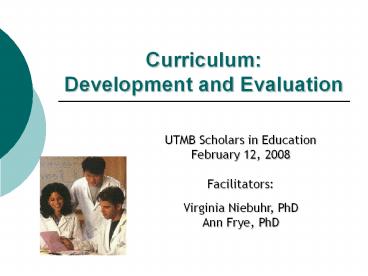Curriculum: Development and Evaluation - PowerPoint PPT Presentation
1 / 24
Title:
Curriculum: Development and Evaluation
Description:
A Letter from the Council of Deans (disclaimer: this is not a true story) ... New Oxford Dictionary 'the subjects comprising a course of study in a school' ... – PowerPoint PPT presentation
Number of Views:252
Avg rating:3.0/5.0
Title: Curriculum: Development and Evaluation
1
Curriculum Development and Evaluation
UTMB Scholars in Education February 12,
2008 Facilitators Virginia Niebuhr, PhD Ann
Frye, PhD
2
A Letter from the Council of Deans
- (disclaimer this is not a true story)
3
First response to the request from the Council
of Deans
BOAT Crew Individual Activity Ask yourself, Do
I even know what Curriculum means?
4
BOAT Building Obesity Awareness Today We are
all in this boat together
- BOAT Goal
- all UTMB employees will become more aware of
issues related to obesity prevention obesity
management - Focused on health of the UTMB employees
- CollaborativeUTMB-Galveston,UTMB-Austin
- Curriculum Planning Team (BOAT Crew)
- representatives chosen by Department Chairs
- consultants OED Faculty
- (disclaimer this is not a true story)
5
Learning Outcomes for the Evening
- It is our goal that, by the end of the evening,
the Scholars in Education will - __
- __
- __
- __
6
Defining Curriculum
- during the Roman Empire
- Latin currere to run
- curriculum racetrack (course) for chariot races
- curricle wheeled chariot, usually drawn by
horses - 17th century, Univ. of Glasgow formal course
of study that students complete
7
Defining Curriculum
8
Definitions
- New Oxford Dictionary
- the subjects comprising a course of study in a
school - Broad formal teaching other learning
experiences - Broader what is taught, how it is taught
learned, how t/l is managed, evaluation - Broadest everything thats happening
Seek not for any definition of curriculum.
There is no such elixir. Sockett H.
Designing the Curriculum. London Open Books.
1976. p 88
9
Types
- Identify Curricula
- current
- proposed or needed
- Types
- One session
- Rapidly repeating (rotations)
- Longitudinal across time
- Entire training program
10
Fitting Together all the Pieces
BOAT Crew Dyadic activity What are the key
elements of a curriculum? 5 minutes
11
Fitting Together all the Pieces
Learning Outcomes (Goals Objectives)(Competenc
ies)
Rationale(why teach this) (based on needs
assessment)
Evaluation (of learning, of teaching)
Implementation Plan who, when, where, how
Learning Environment
12
Rationale
- based on needs assessment
- needs of the body of learners vs. individual
learners - for the greater good
- formal vs. informal
- handed-to-you vs. self-created
Brief large group discussion What might have
been the Needs Assessment for the BOAT
Initiative?
13
Outcomes (Objectives)
- Learning Outcomes (Objectives)
- What do learners need to learn or be able to do?
- Are there things they need to unlearn?
- Measurable action by the learner
- Instructional Objectives vs. Learning Objectives
- Do objectives reflect learning or structure
learning?
14
Verbs
- Use action verbs which result in observable and
measurable behavior - Blooms Taxonomy (handout)
15
Strive to
- Aim for the highest level of cognition possible,
given the resources for evaluating learner
outcome - Avoid verbs with unmeasurable results
- know
- become aware of
- appreciate
- learn
- understand
- become familiar with
16
Identifying Expected Learning Outcomes(doesnt
this sound better than writing objectives?
Boat Crew Dyad activity Write 9 objectives for
BOAT 15 minutes
17
Curriculum Implementation Plan
- BOAT Crew Small Group activity
- Design the implementation plan
- 10 minutes
- What? (content)
- How? (activities? instructional methods?)
- Who?
- Where?
- When?
18
Special terms
- Core curriculum
- Integrated curriculum
- Hidden curriculum
- Curriculum continuum (or alignment)
- Curriculum reform
19
Hidden Curriculum
- hidden curriculum those things learners learn
through the experience of attending rather than
through stated educational objectives
20
ReviewThe Curriculum for the Evening
Rationale(why teach this) (was it based on
needs assessment?)
Learning Outcomes (Goals Objectives)(Competenc
ies)
21
The curriculum for the evening
- It is our goal that, by the end of the evening,
the Scholars in Education will - __
- __
- __
- __
22
The curriculum for the evening
- It is our goal that, by the end of the evening,
the Scholars in Education will - Identify the key elements of a curriculum.
- Practice developing a curriculum implementation
plan. - Practice developing expected learner outcomes
using Blooms Taxonomy - Build a working model of curriculum evaluation
- Apply principles of curriculum evaluation
- Identify how curriculum evaluation resembles and
differs from evaluation of smaller instructional
units - Hidden curriculum
- compare various learning formats individual,
dyadic, small group, large group
23
The Curriculum for the Evening
Rationale(why teach this) (based on needs
assessment)
Learning Outcomes (Goals Objectives)(Competenc
ies)
Evaluation (of learning, of teaching)
Implementation Plan who, when, where, how
Learning Environment
24
Take Home Points
- Curriculum is more than a set of objectives.
- Curriculum is not only what you teach, but how
you teach and how they learn and did it work?. - Curriculum is really a process, not a thing.
25
Resources
- Harden RM (1986). Ten questions to ask when
planning a course or curriculum. Medical
Education. 20356-365. - Oliva, PF. Developing the Curriculum. Boston
Little, Brown and Comp. 1982. - Curriculum environment, climate, quality and
change in medical education a unifying
perspective. Association for Medical Education in
Europe, Medical Education Guide No. 23. 2001. - Writing Learning Outcomes, from the
Professional Development section of the website
for the American Association of Law Libraries
http//www.aallnet.org/prodev/outcomes.asp































